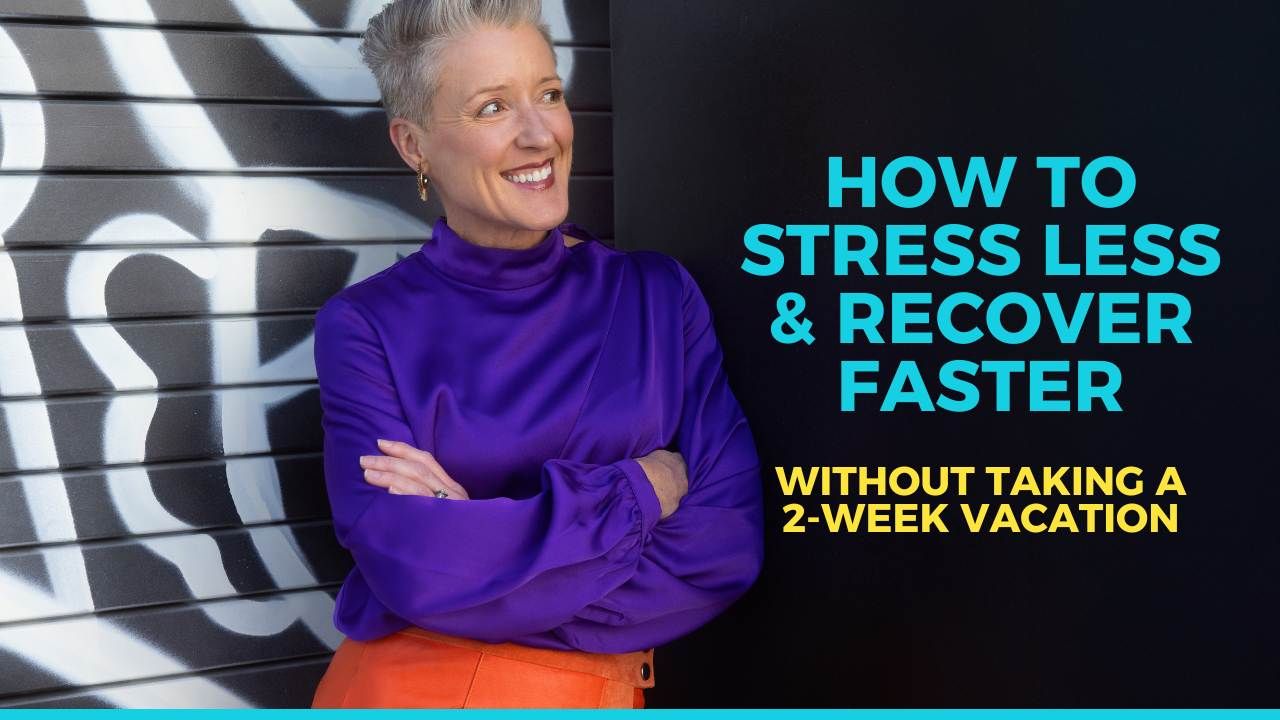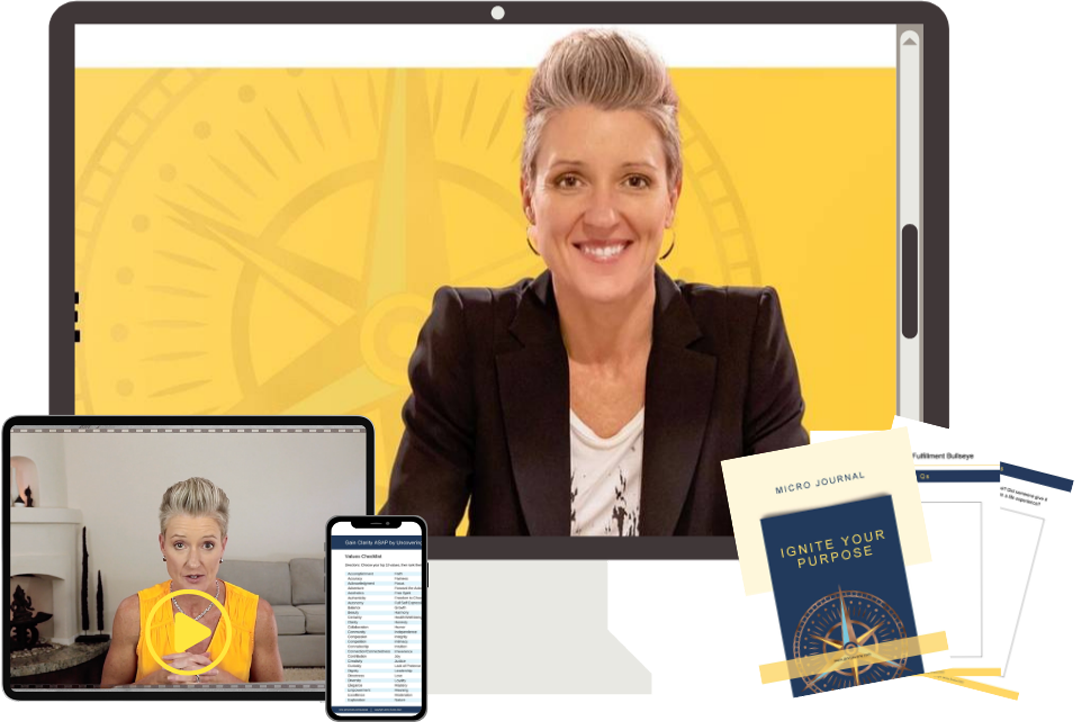How to Stress Less & Recover Faster: Without Taking a 2-Week Vacation
Jul 01, 2025
If one more “wellness expert” tells you to just slow down and rest, you might actually scream.
Because let’s be real, who has time for a damn sabbatical?
You’re juggling deadlines, decisions, and other people’s expectations like a boss (because, well, you are one). You’re high-functioning, high-achieving, and seriously high-key over being tired all the time.
So you try to "rest.” Maybe that looks like a Sunday on the couch in sweatpants, a glass of wine, or zoning out to Netflix. But Monday hits, and you’re just as depleted as you were on Friday. What gives?
Let’s cut through the fluff: you don’t need more downtime, you need real recovery.
The kind that works with your biology, not against it.
And no, it doesn’t require quitting your job, running away to the woods, or meditating for an hour a day. It just takes the right inputs.
In this post, we’re diving into:
-
Why you still feel exhausted, even when you think you’re resting
-
What real recovery looks like (hint: it’s not just “doing nothing”)
-
How to recharge your energy with tools that actually work
👉 Want the cheat sheet?
Download my free guide: 5 Simple Ways to Recharge Your Energy (Without Caffeine)
It’s fast, free, and full of science-backed resets that fit into real life.
If You’re Tired After Resting, You’re Not Actually Recovering
Let’s get one thing straight: rest is not the same thing as recovery.
Just because you spent Saturday horizontal with takeout and TikTok doesn’t mean your body actually recovered. In fact, it probably didn’t.
Here’s why:
When you’re constantly on, handling work, home, life, and a million decisions, your stress response is firing nonstop. That’s your sympathetic nervous system (aka fight-or-flight). It’s great in short bursts, but when it stays on too long? Your body gets stuck in survival mode.
And survival mode isn’t restorative, it’s exhausting.
Real recovery happens when your parasympathetic nervous system kicks in. That’s the one responsible for rest, repair, digestion, and emotional regulation.
If you’re not deliberately shifting into that state, through how you breathe, move, fuel, and manage your energy, you’ll stay tired no matter how much you “rest.”
A day on the couch in your comfiest sweatpants isn’t rest if your brain is still spinning through 12 unfinished tasks.
It’s not about laziness. It’s about being under-recovered.
Let’s fix that.
You Don’t Need More Time, You Need Better Inputs
High-achieving women are often told the solution is to slow down. But slowing down doesn’t help if your biology is still stuck in go-mode.
Recovery isn’t about stopping. It’s about resetting - your body, your brain, and your emotional system.
1. Body: Physiological Recovery
Your biology is your foundation. To reset, give it what it actually needs:
-
A Micro Burst: A short burst of movement that mimics your fight-or-flight response rids your body of cortisol (major stress hormone) and allows your parasympathetic nervous system to take over. Think 60 seconds of jumping jacks, squat jumps or push-ups.
-
Breathwork (like the 4-4-6 method): Slows heart rate and signals safety to your nervous system.
-
Sunlight first thing in the morning: Regulates your cortisol rhythm and boosts energy.
-
Breakfast that contains protein: Fuels your cells, stabilizes blood sugar stable and gives you a steady source of energy.
You don’t need to power through—you need to power up.
2. Brain: Neurological Recovery
Your brain is overloaded. Let’s give it a break:
-
The Power Pause: 60 seconds of silence and breathing to interrupt the spin.
-
Micro-breaks every 90 minutes: A quick stretch or walk = massive payoff in clarity.
-
Brain dumps: Get the mental load out of your head and onto paper.
Your brain isn’t broken. It’s just maxed out.
3. Soul: Emotional Recovery
You can’t recover if you’re guilt-tripping yourself the whole time.
-
Mini-moments of regulation: Reconnect with your sense of purpose and what really matters to you.
-
What’s Working: Your brain is hardwired to pay more attention to negative events - swing the other way and list 3 things that are going well, you’re grateful for, or happy about.
-
Connection: A good laugh or real conversation resets your nervous system and renews your energy.
You don’t need more bubble baths. You need biology-based tools that work.
High Performance ≠ Constant Output
Here’s a lesson from elite athletes: performance improvements happen in the recovery phase.
Let’s break that down.
Every training cycle, whether you’re an Olympic sprinter or a weekend warrior, includes three key stages:
-
Load (stress): The challenge that pushes your system
-
Recovery: The downtime where repair and reset happens
-
Adaptation (growth): The gain where you get stronger, faster, better
Miss one of those steps and the whole system breaks.
And guess which one high-achieving women skip most?
Yep. Recovery.
Imagine training for a marathon and never taking a rest day. That’s your life right now.
You wouldn’t lift heavy every single day without giving your muscles a break. But when it comes to work, leadership, relationships, and life in general? Most women act like rest is optional. Like if they just push a little harder, they’ll finally earn the right to slow down.
That’s not how your biology works.
That’s how burnout works.
Let me tell you about my client Alexis.
She was the definition of high-performing: C-suite executive, two kids, triathlon medals on the wall, and a calendar booked tighter than TSA lines at Christmas. She prided herself on being “the one who always comes through.”
But underneath that confidence? Her body was done.
Despite her green smoothies and productivity hacks, she couldn’t focus in meetings, her sleep was wrecked, and her motivation had flatlined. She was showing up, but she was running on fumes.
When we looked at her stress cycle, it was crystal clear:
All load. No recovery. Zero adaptation.
She’d been training for years, at work, at home, in life, without ever giving her system the pause it needed to rebuild.
So we flipped the script.
We didn’t overhaul her life. We inserted recovery. Micro-resets. Movement. Breath. Morning light. Laughter. Space.
Within two weeks, she wasn’t just functioning, she was leading again. Her team noticed. Her partner noticed. She noticed.
That’s the power of recovery.
Because here’s the truth: Recovery isn’t a reward. It’s a requirement.
The most successful, powerful, impactful women you admire? They don’t push 24/7.
They know when to pause. When to breathe. When to rebuild.
They don’t see rest as weakness, they see it as strategy.
And you can’t produce brilliance without fuel.
Period.
The #1 Energy Reset You’re Not Using
Here’s your fast-track reset strategy:
Move first. Think later.
When in doubt, move your body.
You might be thinking “Wait…movement is work and energy expenditure. Isn’t that the opposite of recovery?”
Movement is the biological antidote to stress. It’s not just about fitness, it’s about flushing out the hormones that are keeping you stuck. Cortisol, adrenaline, all that fight-or-flight residue? Your body was designed to move it out.
When you don’t move, the chemistry of stress just... sits there. Twisting your gut. Hijacking your confidence. Cluttering up your mind. But when you do move?
-
You flush out cortisol (bye, stress hormones)
-
You trigger endorphins (hello, happy chemicals)
-
You reset your nervous system, fast
Motion changes chemistry faster than mindset ever will.
And no, this doesn’t mean you need a gym membership or 60 minutes on a Peloton. This is functional movement for high performers.
Try this:
-
A fast 10-minute walk between Zoom calls
-
A dance break to your favorite hype song
-
A walk-and-talk meeting or phone call
-
A standing stretch while your coffee brews
-
A full-body shakeout when the day starts to spiral
You’re not being “extra”, you’re being efficient. Because sometimes the fastest way to shift your mood, reset your energy, and reclaim your power... is to move your body before your brain catches up.
This Isn’t About Slowing Down, It’s About Rewiring for Speed That Lasts
Let’s get one thing straight: this isn’t about going soft. It’s about going smart.
You don’t need to slow down, you need to recalibrate so your fast pace doesn’t come at the cost of your health, happiness, or sanity.
Because high performance isn’t about grinding until you crash.
It’s about creating the kind of internal stability that lets you show up, speak up, lead hard, and still have energy left over.
Think of it like this: Formula 1 race cars aren’t fast because they never stop. They’re fast because their pit stops are strategic, precise, and non-negotiable. That’s what recovery is for you: the pit stop that keeps your engine from blowing up.
This isn’t a slowdown. This is a system upgrade.
You want to be bold, brilliant, unstoppable? Then you need the biological foundation to hold that level of power without collapsing under it.
🔥 5 Recovery Truths to Tattoo on Your Brain:
-
Caffeine can’t fix chronic depletion.
It might give you a bump, but it’s not REAL energy - it’s a drug. Plain and simple. -
You can’t heal in high cortisol.
Your body won’t recover when it thinks it’s in danger. Safety - physiological and emotional - is required for real reset. -
Rest doesn’t mean doing nothing, it means doing what works.
High-quality recovery is usually a bit active. Intentional movement, focused breathing, morning sunlight, that’s rest that fuels results. -
Performance is a cycle, not a pace.
Push. Recover. Adapt. Repeat. This is how high performers actually grow. -
You don’t need more hustle, you need more capacity.
More fuel. More clarity. More space. Because brilliance without bandwidth is a fast-track to burnout.
You don’t have to collapse to deserve rest. You’re allowed to recharge before you break.
And the more you honor that truth?
The faster, sharper, and more powerful you become, not just for a sprint, but for the long game.
Let’s Make Burnout the Exception, Not the Norm
You don’t need to blow up your life, go on a digital detox, or escape to the Maldives.
What you do need?
Biology-backed resets that actually work in the world you live in.
Micro-habits that stick. Science that makes sense. And permission to rest before you’re wrecked, not after you’ve hit the wall.
This isn’t about slowing down. It’s about sustaining your fire.
And if you’re ready to start?
👉 Download my free guide: 5 Simple Ways to Recharge Your Energy Without Caffeine
Built for women who want results, not fluff. Backed by science. Designed for real life.
No more waiting for a vacation to feel like yourself. Let’s make recovery part of your rhythm, not a reward for crashing.
You in?


